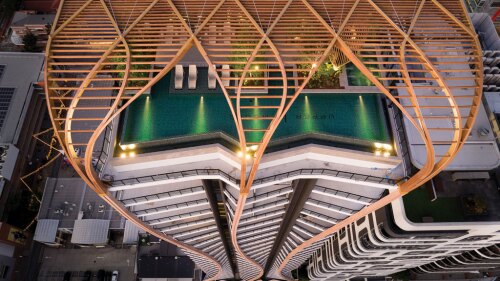It’s described as the largest private real estate venture in history – a $35 billion development on 1,500 acres (607 ha) of reclaimed land in Incheon, South Korea. Designed as a model for future, sustainable city-scale developments across the globe, Songdo International Business District (IBD) is among the first urban areas to seek Leadership in Energy and Environmental Design for Neighborhood Development (LEED-ND) certification.
Developed by New York City-based Gale International (Gale) and Korea’s Posco E&C, the Songdo IBD master plan includes a rich blend of amenities inspired by the world’s great cities including wide boulevards (Paris), a 100-acre (41 ha) Central Park (New York City), a system of pocket parks (London) and a modern canal system (Venice).
Gale intends to bring the smart sustainable city-scale development to other markets. “Nations around the globe are facing unprecedented growth, creating both opportunities and issues for their citizenry,” says Tom Murcott, executive vice president of Gale. “Gale International has been approached by numerous regional planning committees. They have come to evaluate the success of Songdo IBD and to consider how they can acquire the most capable team to address their city-scale development needs. While China has been a near term focus for our business development initiatives, we are exploring city-scale development opportunities in a variety of markets.”
Programming the balance of uses is critical to the development of a thriving city, says Murcott. “Considered urban design creates an active public realm, delivering a high quality of life for the people who live and work there,” he adds.
When completed in 2015, Songdo will be home to 65,000 residents and include 45 million square feet (4,180,500 m2) of office space, 30 million square feet (2,787,000 m2) of residential space, 10 million square feet (929,000 m2) of retail, 5 million square feet (464,500 m2) of hotel space and 10 million square feet (929,000 m2) of public space. It will have 40% green space and feature public transportation including buses, subways and water taxis, as well as extensive bikeways and electric-car rentals.
To date, Songdo IBD has over 50 structures completed or nearing completion, representing more than $10 billion in development investment, Murcott says. The iconic 68-story Northeast Asia Trade Tower, which will be South Korea’s tallest building, is scheduled for completion in 2011, Murcott notes.
Even so, the Songdo IBD real estate market was not immune to the global downturn. Fortunately, Gale secured a $2.4-billion loan to continue project development in December, 2007, enabling work to continue. “From an investment standpoint, there are multiple opportunities for potential partners, but what makes the investment most viable is the quality of life and Songdo’s commitment to become an international business hub, that will create the most value,” says Murcott.
Environmental responsibility is core to the concept of successful cities of the future, he adds. Gale and Posco are working closely with Cisco Systems to create a Smart+Connected Communities (S+CC) model for Songdo and for city development opportunities going forward. “We believe that a smart, sustainable city will have at its core a technology infrastructure that will enable a better life experience for the citizens, allow for more efficient city management and operations, while creating a significant return on investment for the local economy which the development will serve,” Murcott adds.






